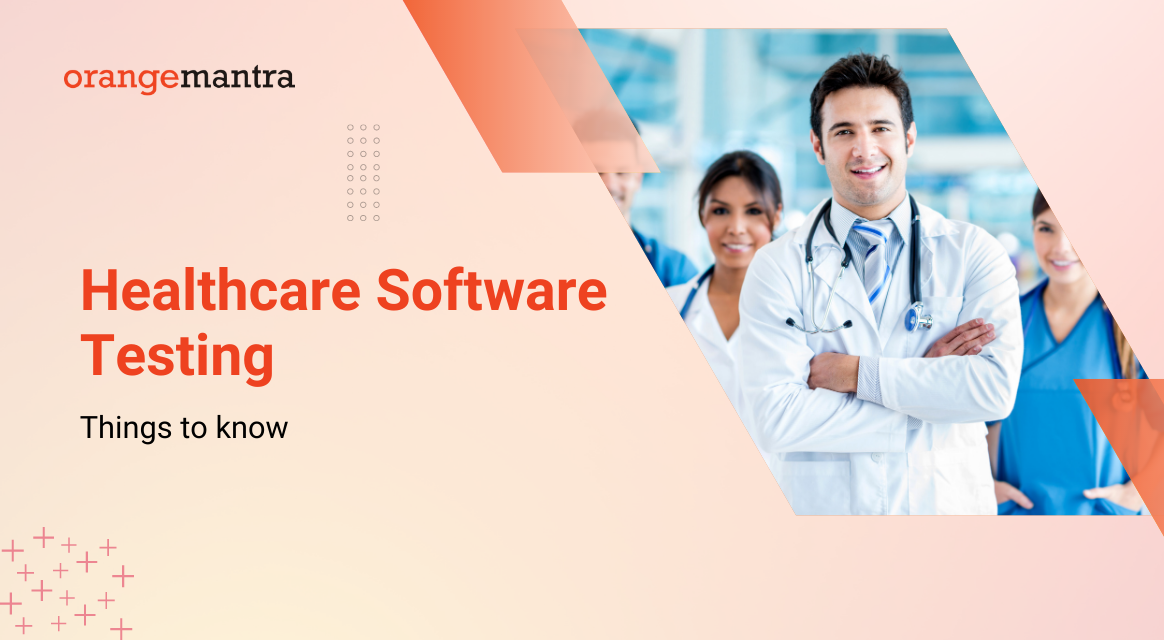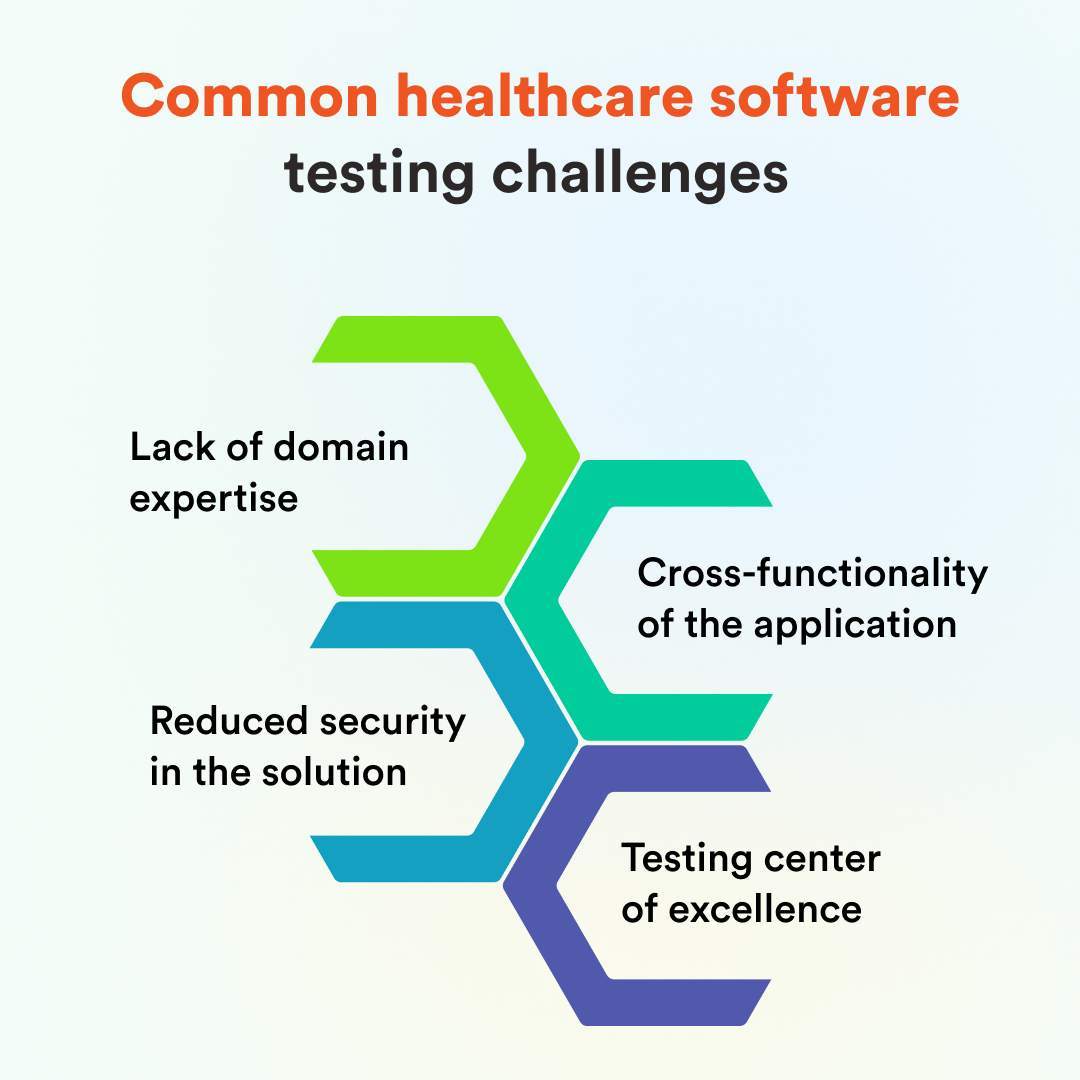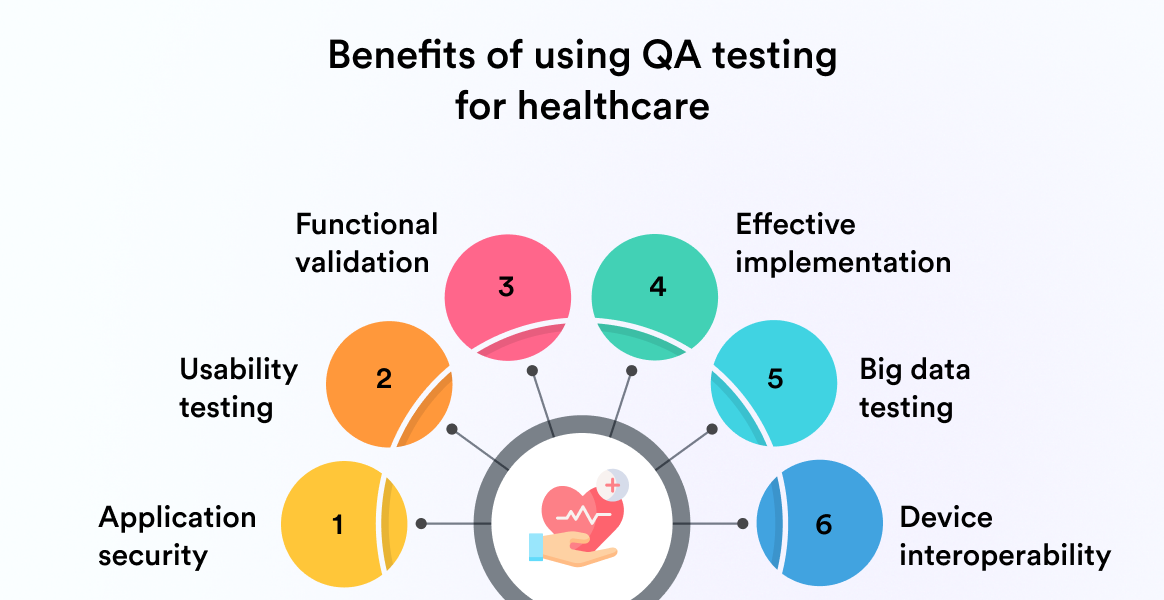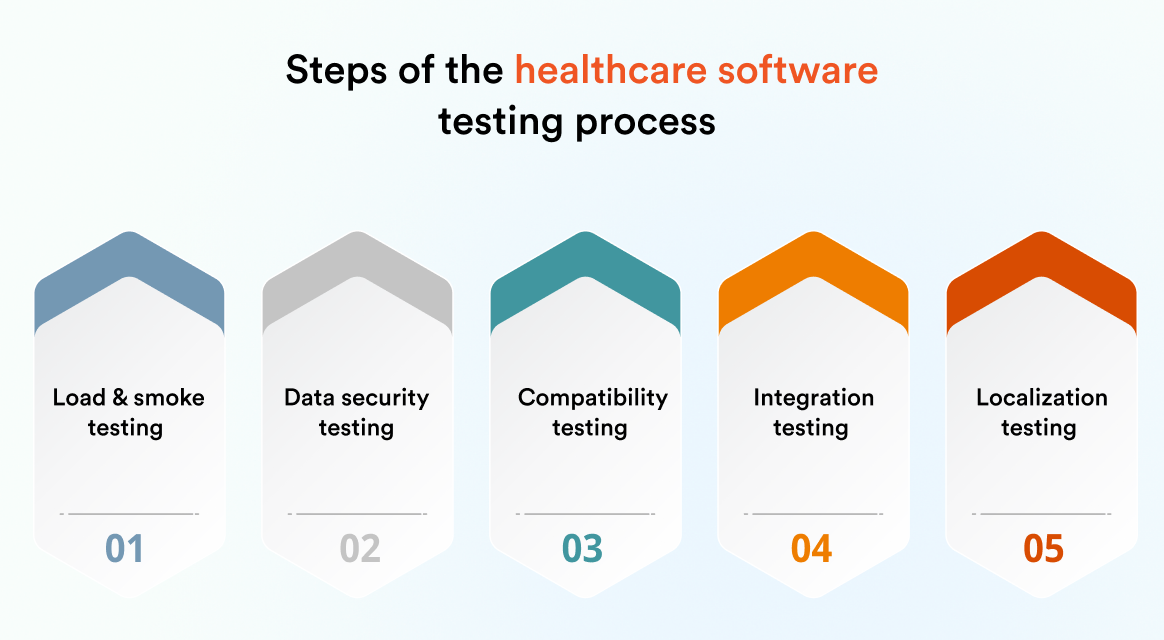
Here’s what you will learn:
The healthcare industry is rapidly growing to adapt to the latest technology trends. And even professionals, firms, and patients want the apps to be of high standards. So, that makes it a necessity for the healthcare software testing process to be rigorous. Because the medical products or services offered to users should be of high quality. And if you want to know how to get the perfect healthcare software, let’s dive in.
Table of Contents
An overview of the use of healthcare software testing
Healthcare software testing is the quality assurance of medical software. Whether it’s from patients, professionals, or practitioners use. But why do we need to ensure the quality of such small software? Because this healthcare software gets the support of many potential users. So, the standards need to meet the compliance, standards, safety, etc. Plus, the quality and performance standards of the market.
The only aim is to get perfect safety, readability, quality, and performance. And ensure every user whether its patients, doctors, nurses, etc. Because each respect and values data presented by these apps. Moreover, in general ways, hospitals can rely on these apps for reimbursements. And patients for reliable assistance even professionals to focus on quality goals.
Definition of Healthcare Software Testing
Healthcare software testing incorporates a multifaceted method to ensure the reliability, functionality, and security of software systems used in the healthcare industry. In essence, it entails subjecting healthcare applications, structures to rigorous testing to stumble on and mitigate any flaws, errors, or vulnerabilities that might compromise patient protection, data integrity, or regulatory compliance.
Healthcare software testing may be described as the systematic process of comparing the performance, functionality, and safety of software programs, systems, or structures designed to be used in healthcare settings. This includes various testing methodologies, along with functional testing, usability testing, protection testing, interoperability testing, and performance testing.
At its core, healthcare software development services aim to ensure that healthcare-era solutions meet the highest requirements of first-rate, reliability, and protection. This entails assessing the software program’s capacity to appropriately process and control patient data, facilitate scientific workflows, integrate with different healthcare systems, and cling to regulatory necessities consisting of HIPAA (Health Insurance Portability and Accountability Act) or GDPR (General Data Protection Regulation).
Importance of Testing in Ensuring Patient Safety
Patient safety is the top priority in the healthcare industry, and the position of software program testing in ensrig that it can’t be overstated. Healthcare software programs are regularly used in essential scientific scenarios in which even minor mistakes or system faults could have extreme results for patient effects. Effective testing facilitates identifying and rectifying any defects or deficiencies inside the software program that might pose a hazard to patient’s data protection.
You need to keep in mind a medication management system should be utilized by healthcare companies to prescribe and administer medications to the patients. Without thorough testing, the device can also fail to correctly monitpor medicine orders, leading to wrong dosages or drug interactions that would affect aptient’s health. By subjecting the software to rigorous testing protocols, developers can find and cope with such issues.
Importance of Testing in Ensuring Data Security
In addition to affecting a user’s safety, healthcare software testing plays an important role in protecting the confidentiality, integrity, and availability of sensitive user data. Healthcare corporations are entrusted with huge amounts of private health data, and any breach or compromise of this data can have severe impact for the affected user’s privacy and be accepted as true.
Effective testing helps perceive vulnerabilities and weaknesses in healthcare software development that might be exploited by malicious threats to gain unauthorized access to affected user data. This includes testing for capability security flaws such as SQL injection vulnerabilities, Cross-site scripting (XSS) assaults, or insufficient encryption protocols.
By proactively identifying and addressing protection threats through complete testing, healthcare businesses can mitigate the hazard of data breaches and ensure compliance with stringent regulatory requirements governing the safety of patient’s data.
Healthcare software program testing is necessary in ensuring user’s data protection and information protection in the healthcare company. By subjecting software program structures to rigorous testing protocols, healthcare companies can resolve risks, enhance device reliability.
Difference between healthcare software testing vs. quality assurance
Here is the common difference between the two services.
Healthcare software testing helps business workflows to offer higher performance. And it produces the desired business results. However, software testing validation gets done in small steps. Such as strategies, implementation, and testing of each parameter to get quality results.
On the other hand, QA helps the users to have a smooth user experience. And to ensure that they optimize the best medical services. Plus, it ensures to align the front-end and back-end processes. Moreover, it offers medical companies a great chance to deliver quality on a budget.
Read Also – Software Testing Methodologies
Common healthcare software testing challenges
Here are some noticeable challenges faced in the medical sector:
Lack of domain expertise
When you have to implement or test medical devices, it occurs as a big challenge. As the healthcare domain is quite vast to understand. Firstly, you need to understand the entities involved like hospitals, experts, and patients. Secondly, the medical firms, regulatory boards, insurance companies, etc.
Because these are the real impact-makers of healthcare solutions. And you also have to remember specific healthcare terminologies. Such as CPT Code, Broker, Medicaid, and HIPAA for reliability. Try to put yourself in the user’s shoes and understand their viewpoints. And healthcare software testing remains a concern with it.
Because as a reliable healthcare service, you must deliver value to end users. And to present such impactful services, you must use several testing types. Such as interoperability, usability, platform, application, function, regression, etc. And if your solutions lack these needful testing it will be challenging for users.
Cross-functionality of the application
Applications are a mix of layers and components. Even healthcare software is complex enough to understand. And that implies any changes made in any layer can show up in another layer. So, you need to employ experienced and verified testers to use.
Moreover, these experts know how to align the software with demands. It includes data integrity, and database queries, before testing to get accuracy. Even you can put AI or other potential technology to use. You can hire a dedicated QA software tester in India at affordable costs. So, that you get the functionality and security for the healthcare software.
Reduced security in the solution
Healthcare software needs more security and safety than any other solution. Because there are multiple patients and experts involved in the process. And all of the users share their confidential data in the database. You may not be aware hackers keeps a close eye on this software.
Because not just your name, contact, and address, but also your account details are present in these solutions. You can consult QA automation testing services for more assistance. So, HIPAA compliance ensures complete transaction security for users. Furthermore, it helps in the regulation of security-related risks and attacks.
Testing center of excellence
We here do not mention any place or laboratory. But it is nowadays a testing model to ensure robustness and scalability. As we know many healthcare forms are emerging in the market. So, there needs to be another testing scope, process, tools, and practices selected for this. Furthermore, your medical app should undergo regular maintenance testing.
Because your end users will get the best experience from the relevant updates. Moreover, automation testing allows less human interference. And it enables you to provide your users with efficiency and accuracy while avoiding unnecessary risks.
Interoperability
Healthcare software development services regularly aim to combine with numerous systems inclusive of electronic health facts (EHR), clinical devices, billing systems, and more. Testing interoperability between unique systems and making sure seamless facts trade may be hard.
Complex Workflows
Healthcare techniques involve complex workflows that fluctuate throughout unique departments and specialties. Testing must cover all possible scenarios and workflows to make sure that the software program functions effectively in real-world conditions.
Scalability
Healthcare software program desires to address massive volumes of statistics and users, especially in sanatorium settings. Testing scalability includes simulating excessive loads to ensure that the software performs optimally beneath height utilization situations.
User Experience
User experience (UX) is essential in healthcare software as it at once influences user adoption and affects user’s data protection. Testing should be aware of usability, accessibility, and intuitive layout to make sure that healthcare experts can effectively use the software for the duration of vital duties.
Medical Accuracy
Healthcare software frequently consists of selection aid structures or clinical algorithms that must be medically correct. Testing those algorithms calls for area understanding and thorough validation towards clinical recommendations and real-world situations.
Real-time Data Processing
In important healthcare conditions, real-time statistics processing is crucial for timely decision-making. Testing must confirm the software program can system and display facts in real time without delays or inaccuracies.
Benefits of using QA testing for healthcare
Best Practices for Healthcare QA
Here are some advantages to using quality assurance for the healthcare sector.
Application security
You might or might not know that medical software have sensitive user data. It can be regarding their health, diseases, current well-being, etc. So, the hacking of these data can cause potential breakages. You can integrate security testing with penetration testing to make your app hackproof.
Simply put, it becomes you can easily instances of hacking processes. Such as login proof, testing against the firewall, scrambling, etc. So, quality assurance ensures the complete guarantee of these applications.
Usability testing
Software hits the chord of success when their usability is high. Supposedly, there might be multiple requests for working hours. And it puts pressure on the specialists to use various applications and test them for their endurance. So, you can use automation testing to get the work done in this cycle easily. You can hire dedicated QA software testers in India at affordable costs. Or you can put other tests to use when you have to increase the app’s usability.
Functional validation
The healthcare sector is widespread across medicines, products, services, etc. But is it all available in one app? Yes, because medical software are relevant to experts and even patients. And you never what is needed at what time. So, guarantee how your application can fit the user’s expectations and needs. Or you can integrate emergency clinic support to the patients with secure sign-in. Moreover, it should convey the necessary message.
Effective implementation
Software is complex but guarantees excellence with zero hassles. So, medical firms need effective involvement of features that support patients care. And efficiently manage user expectations with expanded functionalities. Moreover, quality assurance ensures that these apps work consistently. Effective implementation and QA testing for healthcare software support efficiency.
Big data testing
The medical sector is such a vast sector that manages tonnes of data regularly. Plus, additional health records are also present. So, this crucial data works as a key tool for medical firms. Even the data in fragments gets used in the system. So, big data got your back to serve derivations and interest.
Moreover, it supports data selected from records to align with current needs. And healthcare software testing can help with multiple concerns. Such as medical research, sickness fixes, and innovative support for medical fields.
Device interoperability
There are medical devices and services that connect to serve the user experience. And the integration of modern technology optimizes time and resources. The healthcare sector has a great space for interoperability, compliance, and privacy.
So, the medical apps or any services they offer need rigorous testing. Test automation and assurance can help to dig out any underlying issues. Plus, device interoperability ensures the connection of various devices. So, that you can get accurate results in the shortest time.
Users’ expectations from healthcare software
Here are some said and unsaid user needs from the healthcare system.
Reliability
You know it’s not a new term to any application. Because unreliability causes distress and a bad reputation among users. And you don’t want that with your app? So, users want reliability as the most crucial factor to determine. And the healthcare sector which deals with such potent data regularly.
And showing carelessness in such cases can be life-threatening. So, healthcare software testing ensures error-free performance. Plus, it helps the app to manage heavy databases easily with quality.
Compatibility
Now, compatibility is another crucial to square down in healthcare. As mentioned earlier device interoperability needs compatible features. Because you may integrate medical devices or applications via your services. So, the basic components of healthcare should be compatible.
And work together to fulfill user demands. So, this explains how the healthcare sector can offer excellent solutions rather than just buying. Custom healthcare software helps experts to get solutions to their issues.
Usability
Whether it’s UI/UX, the app design should be easy to use for the users. The healthcare software should offer high usability against its competitors. It is because you should keep your users at the center of the business. And they should feel connected and get reliable assistance.
Plus, it should assist every type of individual. Because your users can be working professionals or they are simple end users. As we know, many people don’t know about computer skills. Or maybe they pick your healthcare software to start with. So, you should align the UI/UX that should be clear and intuitive.
Integrations
Feature-rich and secure integrations make your healthcare software more meaningful. And these APIs help your experts to expand the application functionality. Plus, it supports you to build apps without a scratch to save resources and time. When you plan to develop medical apps you will find lots of APIs. So, that it can serve professionals, patients, firms, etc. And QA testing for healthcare can offer insightful integrations for your app.
Security
Last, but not least. Security is one of the essential factor user want in medical apps. So, when you aim to store confidential patient data, then it should focus on security. You can refer to reliable data storage. As it becomes the making or breaking of your healthcare projects.
You can use encryption methods to secure your medical apps. Because it allows you to safeguard your useful information from hackers. You can hire dedicated QA software testers in India at affordable costs.
Steps of the healthcare software testing process
Here are some steps involved in assuring quality standards in healthcare software: (Infographics)
Load & smoke testing
As the name suggests, it refers to keeping the application under opposite circumstances. In load, you keep the healthcare software under some extra load. Whereas, in smoke, you keep the load at a minimum and take the results.
Smoke testing works well during the early stages of the development process. But the load testing checks the real durability of your app under stressful conditions. So, that developers can know how much load the app can handle.
Data security testing
Coming down to another testing type that helps to discover the app’s vulnerabilities. Data security tests for the flaws in the back end. Although, this risky testing type can cause effects if not done seriously. Plus, it can cause data loss, security flaws, data leaks, etc. It is also an alternative to penetration testing to avoid any planned attack.
You can consult QA automation testing services for more assistance. Besides checking the app for quality, it also gives results of app exploitation. Plus, it also comes with ideas on how to repel these attacks.
Compatibility testing
This testing checks for the program interaction between the components. It checks the network, OS, hardware, browsers, software, etc. And check if the application works and responds in every version. The team of QA experts tests every version and component. So, that it can plan the budget as per the needs. And even healthcare software testing can help with excellent performance.
Integration testing
What if the modules or components don’t respond to each other? There is another QA testing for healthcare to check it. Integration testing checks the application for different types. Such as top-down, bottom-up, sandwich, big-bang, functional, etc. Moreover, this tests your software modules separately and completely.
Localization testing
It is valid for products or services that vary as per region classification. Localization testing helps to get the geographical classification in your healthcare software. You can hire dedicated QA software testers in India at affordable costs. It includes the integrations allowed in a particular region, country, etc.
Future Trends in Healthcare Software Testing
The healthcare industry is present process of rapid transformation pushed with the aid of improvements in era, changing patient expectancies, and evolving regulatory necessities. In parallel, the landscape of healthcare software testing is likewise evolving to maintain pace with these adjustments. Here are a few rising traits and predictions shaping the future of healthcare software testing:
AI and Machine Learning in Testing:
Artificial intelligence (AI) and machine learning (ML) technologies are revolutionizing healthcare software program testing. AI-powered testing tools can automate, predictability issues, and analyze large quantities of records to discover patterns and anomalies. Machine learning algorithms can also optimize testing procedures by studying from beyond test outcomes and constantly improving testing techniques.
Automation Everywhere:
Automation plays a crucial role in healthcare software testing, permitting faster testing cycles, improved testing and progressed accuracy. Test automation frameworks tailor-made mainly for healthcare programs will emerge, providing functions inclusive of healthcare-unique check libraries, interoperability testing tools, and integration with digital health record (EHR) structures.
Shift-left Testing:
As agile and DevOps practices benefit momentum inside the healthcare enterprise, there might be a greater emphasis on shift-left testing approaches. This involves integrating testing sports earlier in the software program development lifecycle, permitting quicker feedback loops, and identifying troubles quicker. Shift-left testing practices will help healthcare agencies supply remarkable software program answers greater efficiently and price-correctly.
Security Testing:
With the growing risk of cyberattacks and facts breaches in healthcare, safety testing will become increasingly vital. Testing for vulnerabilities including ransomware, phishing assaults, and unauthorized access can be paramount to protecting affected user’s data and preserving regulatory compliance. Security testing will evolve to encompass more advanced techniques which include penetration testing, threat modeling, and security code critiques.
IoT and Wearable Device Testing:
The proliferation of Internet of Things (IoT) devices and wearable technologies in healthcare will force the need for specialized testing processes. Healthcare software program testers will need to ensure seamless integration and interoperability among software programs and a big selection of IoT solutions for healthcare and wearables. Testing will recognize information accuracy, tool connectivity, and value in real-international healthcare environments.
Blockchain Testing:
Blockchain technology holds promise for boosting information safety, integrity, and interoperability in healthcare. Testing blockchain-based healthcare packages will involve validating smart contracts, making sure consensus mechanisms, and testing for scalability and overall performance. Specialized blockchain testing tools and methodologies will emerge to satisfy the precise requirements of blockchain-powered healthcare systems.
Regulatory Compliance Testing:
Regulatory requirements in healthcare continue to evolve, with new standards and guidelines being added to cope with rising challenges. Testing practices will ensure compliance with guidelines which include the Health Insurance Portability and Accountability Act (HIPAA), General Data Protection Regulation (GDPR), and numerous enterprise-specific standards. Automated compliance testing tools will simplify the technique of validating software programs toward regulatory necessities.
Concluding Thoughts
From making sure of regulatory compliance to protect user’s data and improving device reliability, healthcare software testing performs a pivotal position in the delivery of exceptional patient care.
We’ve delved into the definition of healthcare software testing, highlighting its critical significance in upholding patient safety and information safety. Through rigorous testing protocols, healthcare organizations can mitigate risks, become aware of vulnerabilities, and ensure that software answers meet the very best standards of first-rate and reliability.
Effective healthcare software testing is not only detecting defects; it’s approximately improving affected user results and transforming the transport of healthcare services. By investing in robust testing practices, healthcare agencies can beautify the efficiency of medical workflows, streamline operations, and in the long run improve the first-rate care introduced to patients.
As era continues to increase and the healthcare sector evolves rapidly, the importance of powerful software testing should be the primary goal for businesses. By staying abreast of emerging trends, adopting modern testing methodologies, and fostering collaboration across multidisciplinary teams, healthcare corporations can navigate the complexities of software program improvement and drive positive effects for patients and vendors alike.
Effective healthcare software program testing is not only a necessity—it is a catalyst for innovation, development, and excellence in patient care.
Healthcare software testing is a crucial step to follow in the development process. So you have to take care of every reason, benefit, and all other aspects. For more consideration, consult OrangeMantra, a leading software testing company for smooth functioning of your projects.
FAQs
What are some of the most common challenges in QA testing healthcare applications?
- The software’s level of complexity.
- Limited access to live patient data
- Regulation compliance
- Integration with other systems.
- Unexpected user scenarios.
What exactly is healthcare software testing?
Healthcare domain testing is an essential component of the software development process that should not be overlooked.
What are the roles and responsibilities of healthcare testers?
Create, run, and maintain healthcare test cases and automation scripts. Implement test automation






